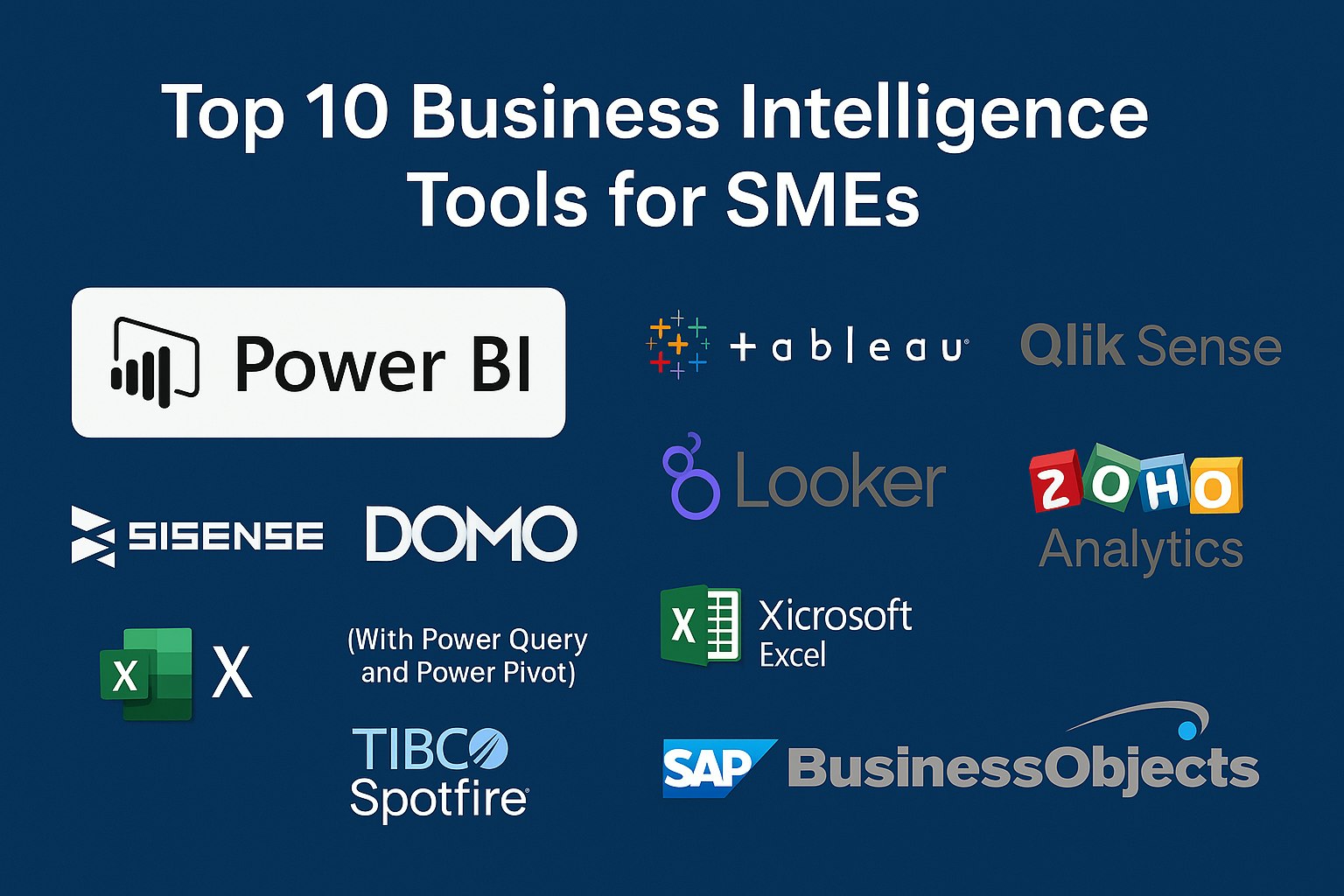Small and medium-sized enterprises (SMEs) are realising the importance of leveraging data to stay competitive and make informed decisions. However, managing and interpreting data can be complex without the right tools. This is where business intelligence (BI) tools come in, enabling organisations to harness the power of data and transform it into actionable insights.
In this article, we will explore the top 10 business intelligence tools for SMEs. Among these tools, Microsoft Power BI stands out as a powerful and cost-effective solution, especially for smaller businesses. At NetMonkeys, we understand the importance of empowering SMEs with the right technology to unlock their full potential. We’ll discuss not only the features and benefits of these tools but also how they can help your business thrive in today’s data-driven world.
1. Power BI – The Leading Business Intelligence Tool for SMEs
When it comes to business intelligence tools, Microsoft Power BI is the undisputed leader in terms of accessibility, affordability, and integration with existing software ecosystems. Power BI is one of the most popular business intelligence software solutions for SMEs, offering a user-friendly interface, strong data visualisation capabilities, and seamless integration with Microsoft Office 365 products like Excel and SharePoint. This makes it a fantastic choice for businesses already using Microsoft tools, ensuring a smooth transition to BI.
Power BI provides businesses with the ability to create interactive dashboards, share reports, and access real-time data from any device. What sets Power BI apart from other business intelligence platforms is its ability to consolidate data from multiple sources, providing a unified view of your business operations. Whether you're tracking sales, inventory, customer satisfaction, or financial performance, Power BI can bring all your data together in one place.
For SMEs, the cloud-based version of Power BI is particularly attractive. It allows businesses to scale their data needs without investing in costly infrastructure. Moreover, Power BI offers flexible pricing, including a free version with limited features and a Pro version for more advanced capabilities.
At NetMonkeys, we work closely with SMEs to implement business intelligence solutions like Power BI, helping you unlock insights that drive better decision-making. Whether you're a manufacturer, retailer, or professional service provider, Power BI offers powerful features that are tailored to meet your needs.
2. Tableau – Powerful Data Visualisation for SMEs
Tableau is another highly regarded business intelligence platform that is favoured by organisations of all sizes. Its strength lies in its data visualisation capabilities, making it an excellent choice for businesses that need to present complex data in an easily understandable format. Tableau allows users to create sophisticated visual dashboards, charts, and graphs that can be shared across teams, improving collaboration and communication.
Tableau’s ability to connect to various data sources, including spreadsheets, databases, and cloud applications, makes it a flexible tool for SMEs. While it’s known for its advanced features, Tableau’s intuitive interface means that non-technical users can still leverage its capabilities to gain valuable insights.
However, it’s important to note that Tableau can be more expensive than other tools like Power BI, making it a better fit for businesses with more substantial budgets or those with complex data requirements.
3. Qlik Sense – A Flexible and Scalable BI Tool
Qlik Sense is a business intelligence software solution that stands out for its unique associative data model. Unlike other BI tools that rely on traditional data hierarchies, Qlik Sense allows users to explore data from multiple angles and discover connections that might otherwise be overlooked. This makes it particularly useful for SMEs that need to uncover hidden insights across large datasets.
Qlik Sense is a highly flexible and scalable tool that allows SMEs to start small and grow as their data needs evolve. It offers both cloud-based and on-premise deployment options, so businesses can choose the setup that best suits their requirements. Additionally, Qlik Sense supports self-service analytics, enabling non-technical users to create their own reports and dashboards.
For businesses that require advanced analytics and data exploration capabilities, Qlik Sense is a robust business intelligence platform that provides the tools needed to make data-driven decisions.
4. Looker (Google Cloud) – A Modern BI Tool with Advanced Capabilities
Looker, now a part of Google Cloud, is a modern business intelligence platform that focuses on simplifying data exploration and reporting. Looker’s ability to integrate seamlessly with Google’s cloud infrastructure makes it an ideal choice for businesses that rely heavily on Google Cloud products like BigQuery.
One of Looker’s standout features is its use of a unique data modelling language called LookML, which allows users to define relationships between different data sources and create custom reports. This provides businesses with greater control over their data, ensuring that reports are consistent and tailored to their needs.
Looker is well-suited for SMEs that need a scalable business intelligence software solution with advanced analytics capabilities. If your business already uses Google Cloud, Looker can be a natural addition to your BI stack, helping you gain deeper insights into your data.
5. Sisense – Empowering SMEs with Advanced Analytics
Sisense is a business intelligence tool that allows SMEs to integrate, analyse, and visualise complex data from multiple sources. Its standout feature is its ability to handle large datasets and provide in-depth analytics. Sisense simplifies the process of connecting to different data sources and allows businesses to perform detailed analysis without the need for advanced technical skills.
The platform’s drag-and-drop interface makes it easy for users to create custom dashboards and reports. Additionally, Sisense offers a range of advanced analytics features, such as predictive analytics, which can help businesses forecast trends and make data-driven decisions.
Sisense is ideal for SMEs that require a more sophisticated BI tool, particularly those in industries like manufacturing, e-commerce, or logistics, where large volumes of data need to be analysed and visualised quickly.
6. Zoho Analytics – An Affordable BI Solution for SMEs
For SMEs looking for an affordable yet powerful business intelligence software solution, Zoho Analytics is a great option. With a user-friendly interface and a wide range of features, Zoho Analytics makes it easy to create reports, dashboards, and data visualisations without needing extensive technical knowledge.
Zoho Analytics supports integration with various third-party applications and data sources, allowing SMEs to bring together data from different systems for comprehensive analysis. Additionally, Zoho Analytics offers a free version with limited features, making it an excellent choice for small businesses that are just getting started with BI.
The platform’s affordable pricing and ease of use make Zoho Analytics a popular choice for SMEs that need a simple, cost-effective business intelligence platform.
7. Domo – A Cloud-Based BI Tool with Real-Time Insights
Domo is a cloud-based business intelligence software solution that enables businesses to integrate and visualise data from various sources. Domo’s real-time data capabilities allow businesses to monitor key performance indicators (KPIs) and track business performance on the fly. This is particularly useful for SMEs that need up-to-date information to make timely decisions.
Domo’s drag-and-drop interface allows users to create custom dashboards, while its powerful analytics tools enable deeper insights into business operations. Additionally, Domo offers collaboration features, allowing teams to work together and share insights in real time.
While Domo can be a bit more expensive than other tools, its comprehensive set of features makes it an attractive choice for SMEs that require real-time, cloud-based BI solutions.
8. Microsoft Excel with Power Query and Power Pivot – A Cost-Effective BI Solution
For many SMEs, Microsoft Excel is already a go-to tool for data analysis. By using Excel’s Power Query and Power Pivot features, businesses can transform Excel into a powerful business intelligence tool that can handle large datasets, create sophisticated reports, and perform complex data modelling.
Excel’s familiarity makes it an ideal starting point for SMEs that are new to business intelligence but still want to leverage powerful analytics tools. With Power Query, users can easily import and clean data from multiple sources, while Power Pivot allows for more advanced data modelling and analysis.
While Excel may not be as feature-rich as some dedicated BI tools like Power BI or Tableau, it remains a viable option for SMEs that need a cost-effective way to perform basic to moderate levels of data analysis.
9. TIBCO Spotfire – Advanced Analytics for SMEs
TIBCO Spotfire is a comprehensive business intelligence platform that provides SMEs with advanced analytics, data visualisation, and reporting tools. Spotfire is well-suited for businesses that need to perform in-depth analysis on large and complex datasets. The platform supports data discovery, predictive analytics, and real-time monitoring, making it a powerful tool for businesses in industries like manufacturing, retail, and finance.
Spotfire’s user-friendly interface ensures that non-technical users can access powerful analytics tools without needing to rely on IT teams. Additionally, its ability to integrate with various data sources makes it a flexible solution for SMEs with diverse data needs.
10. SAP BusinessObjects – Enterprise-Level BI for Growing SMEs
SAP BusinessObjects is an enterprise-level business intelligence software solution that can be scaled down for SMEs. Offering a full suite of reporting, analytics, and data visualisation tools, SAP BusinessObjects provides businesses with a holistic view of their operations. While it can be more expensive than some other options, it is ideal for SMEs that require advanced reporting and analytics capabilities.
If your business is planning to expand and requires a robust, scalable BI solution, SAP BusinessObjects could be the right fit.
Conclusion: Power BI – The Best Business Intelligence Tool for SMEs
When it comes to choosing the best business intelligence tools for your SME, Microsoft Power BI offers the perfect balance of power, ease of use, and cost-effectiveness. Whether you’re a small startup or a growing business, Power BI allows you to transform your data into meaningful insights that can drive success. NetMonkeys has extensive experience working with SMEs to implement business intelligence platforms like Power BI, enabling businesses to harness the power of their data.
Power BI’s integration with Microsoft Office 365, flexible pricing, and advanced features make it the ideal choice for SMEs looking to improve their decision-making processes, enhance collaboration, and stay ahead of the competition. By partnering with NetMonkeys, you can take full advantage of Power BI’s capabilities and empower your business to thrive in today’s data-driven world.
Related posts
Visit blog
Think Like a Hacker: Why Most Cyberattacks Start with Human Error, Not Brute Force
Discover why most cyberattacks begin with overlooked vulnerabilities, such as missed updates, reused passwords, and phishing, rather than brute force

Business Email Compromise: Identifying and Preventing Attacks
Discover how to identify and prevent Business Email Compromise (BEC) attacks. Learn key red flags, common scams, and security best practices to protect your business from cyber fraud. 4o

10 Key Benefits of Power BI for Manufacturers
Discover how Power BI helps manufacturers optimise production, reduce costs, enhance quality control, and drive data-driven decision-making for business success.
